 |
|
 |
| |
|
2013
April
28-30
|
Do constellations change within one person's lifetime?
We think of the constellations in the sky as unchangeable.
We're looking at the same star patterns that the ancient Greeks saw.
Or are we?
There have certainly been no major changes within recorded history,
except the gradually exploding star Eta Carinae, visible only from places considerably
south of here. It has been putting on quite a show for our Australian friends
for 300 years, ever since the
first telescopes were aimed at it.
And there are stars that vary in brightness periodically, such as Mira in Cetus.
Its variations are dramatic but go unnoticed because it's not part of a familiar
star pattern. It's one star out in the middle of nowhere, and it's hard to remember
what it's supposed to look like.
But there has been one genuine change to a familiar constellation during our
lifetimes. The star Delta Scorpii, marked with the arrow here, brightened about 12
years ago to become brighter than Beta (just above it). It had been about half a
magnitude fainter than Beta, so this changed the appearance
of a very familiar and prominent pattern of stars. Delta faded again around 2005
but has come back to maximum brightness again. It seems to have undergone a
genuine physical change.

Take a look at it when it's high in the southern sky later this summer.
(Map from Wikipedia, credited to Sky and Telescope magazine with permission
for unrestricted reuse.)
[Addendum:] What I'm talking about is whether the visible appearance of constellations
changes within one person's lifetime. A correspondent points out that the naming and mapping of the constellations
has changed a good bit in the past 300 years as star maps became standardized. The most obvious change is that the large
southern constellation Argo was divided up into several smaller ones. But that didn't change
the way the stars look in the sky.
Permanent link to this entry


|
2013
April
27
|
More retirement memorabilia and a confession
Here are two frames from the rotating "news" page of the IAI's web site.
Thanks to Zhang Shu and others for the web design...
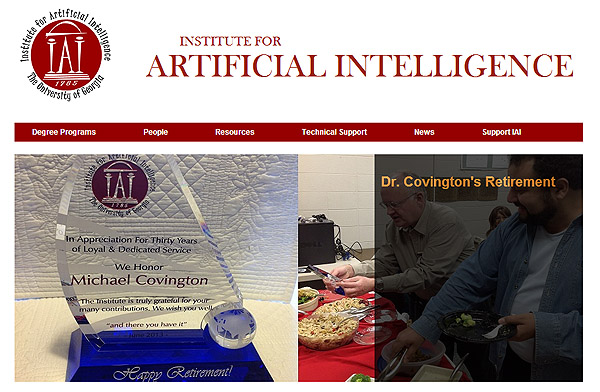
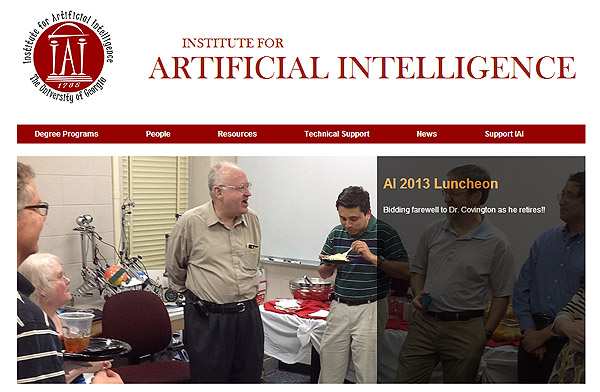
Now for the confession:
Classroom teaching is actually not my first love among scholarly activities.
It is something I can do, but I get more satisfaction from doing original research
and especially from expository writing, writing books or articles that explain
existing knowledge so that people can understand it. That is a theme that ties together
many seemingly unrelated things I've done, and rather late in life I found out how much
it is in demand in the business world.
The person who can write best (or communicate best) runs the company
because that person is everyone else's source of knowledge.
I'm not aiming to run companies, but my consulting services almost always result in
clearly-written reports that clients can use and circulate within their organizations.
I've long felt that if you do something, but don't write it down,
you haven't really done it. Nor am I willing to work very long without writing
things down. The "write-up" is not a task left for the end;
it keeps me organized as I go. Sometimes I am my
most important audience.
Permanent link to this entry


|
2013
April
26
|
"This device does not support playing protected content"
(spoken error message from Ford Sync)
So you've put some music MP3 files on a USB drive... and you plug
it into your Ford Sync audio system... and a slightly monotonous
female voice tells you Sync has detected a new device, and then says,
"This device does not support playing protected content..."
Just press OK, and it will play anyway, and you will not hear the error
message again from the same USB drive. Sync isn't objecting to playing from a USB drive; it's
just telling you that your thumb drive doesn't do any rights management.
As long as your MP3s are freely playable, there's no problem.
Incidentally, in order to get Sync to play from a USB device, you
have to press Menu, Media Menu, Select Device, at least on my 2012 Escape.
Permanent link to this entry


|
2013
April
25
|
My last University of Georgia class?
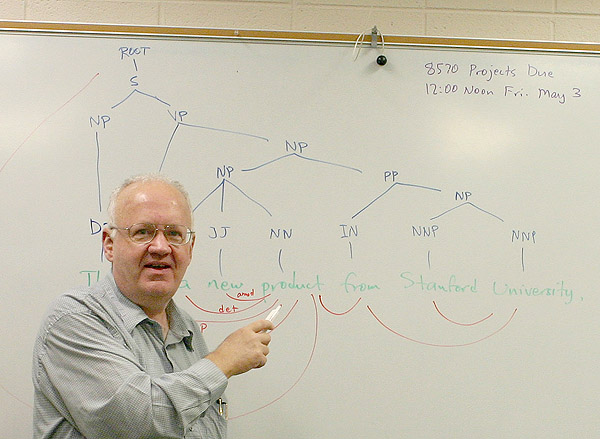
Today was my last day of teaching at the University of Georgia.
The term is not actually over; there are two more days of classes,
although my course does not meet. Then, during exam week, my
students will do term projects and I will grade them.
But today was the last class meeting — possibly — of
my entire career.
My daily routine was much like other recent days.
Breakfast and e-mail at home, then a trip to campus in mid-morning,
via the northerly route (Epps Bridge Parkway, Broad, Hull, Wray, and
Lumpkin streets), parking in the Georgia Center parking deck.
Work (mostly e-mail and class preparation) in my office, with lunch
(a turkey sandwich) at my desk.
A brief work session in the Science Library,
then class from 2:00 to 3:15,
during which I talked about open-source NLP tools
(NLTK, Stanford CoreNLP, Apache OpenNLP, and GATE)
and then demonstrated my vintage-1989 SP0256A speech synthesizer.
After class, back to the library
for the last hour and a half of the day.
(I go to the library, not for the books, but to spread out my
work and laptop on a table, undisturbed, without the smell
of cigarette smoke that still gets into my office somehow.)
Then to the gym for 25 minutes of exercise; then home;
a celebratory steak dinner with Melody at Fatz
followed by a mundane trip to Publix on the east side; and I'm
going to spend the rest of the evening reading and resting.
We had excellent, mild, sunny weather, just like my first
day of classes at Georgia, as a student, back in 1973.
Permanent link to this entry


|
2013
April
21-24
|
Something lunar
Some quick images of the moon under average conditions, using my Celestron 5 telescope
(now a third of a century old) and Canon 60Da camera.
First, the whole moon, with colors enhanced to bring out the differences between
different kinds of rocks on the surface:

Second, a "close-up" view of the crater Plato, the mountain range called the Lunar Alps,
and the long, thin Alpine Valley (Vallis Alpes), which was long thought to have been
carved by a meteor striking the moon at a grazing angle, but now, if I'm not mistaken,
it's believe to be a volcanic feature.

This was taken by using the camera to record 640×480 video, then selecting and
stacking the best 1100 out of 1340 frames using RegiStax 6.
Permanent link to this entry


|
2013
April
19-20
|
Unfinished projects
As I get ready to move out of my UGA office, I'm struck by how many projects I started
years ago and never finished. Some file folders and stacks of papers contain things I've
been meaning to pursue for 20 or 25 years.
Of course, this is entirely proper. With creative research, you never throw away
a good idea or the
means to continue a piece of work. Nor do you pursue everything; there is only time to pursue
the most promising projects. But an old project may come back to life at any time.
I certainly don't want to fall victim to the fallacy of sunk costs and think that I have to
finish everything I start. If I did that, I'd be finishing a lot of unimportant things
instead of doing better things. So old projects get put into suspended animation.
There are unfinished projects at home, too, in my electronics workshop.
In the 1990s, I wrote electronics magazine articles prolifically,
including the "Q&A" column for Electronics Now.
This changed around 2001, when I started major new research projects,
my consulting practice began to flourish, and for various reasons my family
responsibilities increased. So my workshop, which was thriving in the 1990s,
slowed down. It didn't stop in its tracks; I've even written half of an electronics
textbook, which I hope one day to finish.
When I have more time to get into electronics, there will be some serious (and difficult)
cleaning out to do. In the late 1980s, electronic equipment and parts were hard to
obtain inexpensively, so I stockpiled a lot of parts and materials, and accumulated
good test equipment that was, at the time, 20 to 30 years old. Now that equipment
is half a century old, or more.
That raises two problems. Old equipment isn't reliable because some parts,
especially electrolytic capacitors, deteriorate with age. And new equipment has a much
better price-performance ratio. With test equipment especially, I noticed great gains
in performance in the 1980s and 1990s — which is why industry was selling off old
equipment cheaply and I could buy it — but at the time, prices were rising sharply.
Now prices have fallen just as sharply. A really good multimeter cost $50 in 1970;
that's $300 in today's dollars, which would buy you an outstanding lab-grade
multimeter. A quite serviceable one costs $20.
For parts and materials, we have a much better supply system than we used to.
In 1970, a hobbyist or small-scale experimenter would buy parts from Radio Shack
or the local TV-repair parts distributor if the right items could be
obtained at all. Much of the challenge of hobby electronics in the 1970s
was figuring out how to build interesting things out of parts that were widely available
for use in TV and audio repairs and simple generic industrial electronics. Cutting-edge high-technology parts
weren't available locally. Mail-order suppliers had everything, but the minimum orders
and shipping costs were large.
Now we have a better
supply system (Internet ordering, cheap shipping, and eBay), and what's more the parts
themselves are radically cheaper. In 1966, the first time I bought one, a single resistor
cost 13 cents. That is over $1 in today's money. Now resistors are often less than 1 cent
each. The cheapest surplus transistors were about $1 in 1966 (about $7 in today's money);
today, high-quality American-made ones are 6 cents each. The surplus stockpiling that I
did in the 1980s no longer makes sense.
Further, the trade-off between money and time is not, for me, what it used to be.
When I do electronics nowadays, my goal is not just to learn something and see whether
I can get something to work. I need to fix something reliably or build
something reliable. Surplus parts of uncertain quality are no longer
acceptable.
Then there are the parts that came and went. In the 1980s, discrete logic gates were
going to revolutionize everything, so we all learned how to use them, stocked up, and
then never actually built anything with them. Now every non-trivial control circuit
contains a microcontroller, which costs only $2 or so. This is sad in one way:
a programmed microcontroller can't be replaced or repaired by someone who doesn't have
its software; in effect, it's an unrepairable "black box." During the brief heyday of
discrete gates, at least everything was repairable.
So I feel a bit like Rip Van Winkle waking up in a world I've been neglecting for ten
or fifteen years. But I don't plan to plunge back into hobbies or old projects right
away. I have too much new work to do. I'm hoping to work full-time as a consultant
for the next ten years or more. Some of those long-standing hobby projects are going to
have to wait.
Permanent link to this entry


|
2013
April
16-18
|
Will we miss the bus?
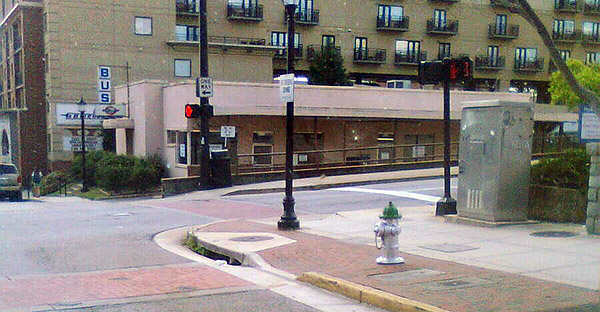
Yet another end of an era. After the better part of a century, the Southeastern Stages
bus station in Athens, Georgia, is closing. Southeastern Stages and Greyhound will
operate out of a gas station on the west side of town. Whether the buses will also
stop downtown, I can't find out; surely so; in fact, they ought to stop at the
multimodal transportation center, which is already the station for Megabus and the
city bus system.
Right now, a round trip to Atlanta costs $60 on Southeastern Stages or $20 on Megabus.
I think we could support a thriving bus line to Atlanta if the buses were more
frequent. The problem is, if you have only two or three buses per day, trying to take
a day trip is risky because you might get delayed and miss the last bus back. If there
were a bus about once an hour (like the ones between Oxford and London that I enjoyed
in the summer of 1976), there would be no problem. What I would do in those days was
saunter down to the bus station and take the next bus that left; spend much of the
day in London; eat dinner; and take the next bus back to Oxford, secure in the
knowledge that the buses wouldn't stop until something like 11 p.m.
More generally, one of the paradoxes of public transportation is that unless the buses
are rather frequent, they're not very useful. Half a bus system is as bad as none.
Congratulations to Erin Colbert-White, who has successfully passed the
final exams for a Ph.D. dissertation about a famous
talking parrot. I am honored to have been on her committee and to have been a co-author
of some of her work — about the linguistics a non-human speaker!
Permanent link to this entry


|
2013
April
14-15
|
Google Chrome fills up the hard disk with .sst files
The Institute's server almost crashed today with a strange problem,
and, possibly for the last time in my career,
I had to rush down to the lab on a Sunday afternoon to fix things.
Fortunately, an alert graduate student noticed that the shared hard disk
was nearly full, and we didn't have an actual crash. But we came close.
The culprit was strange. Google Chrome, running on the office PC
of another graduate student who had locked his computer rather than log out
for the weekend, was constantly writing files with names like 008410.sst in
the user's Application Data folder. The files were big (4 MB each) and were
being created at the rate of about twenty per minute of time.
We shut down his computer, but we still don't know exactly what was going on.
If you use Google Chrome, you may want to know if your computer
has the same problem.
To find out, go to the Run box
and copy or type this:
"%APPDATA%\Google\Chrome\User Data\Default\Session Storage"
If that doesn't yield anything, copy or type this instead:
"%LOCALAPPDATA%\Google\Chrome\User Data\Default\Session Storage"
Then look at the .sst files in the folder that opens.
Windows thinks they are cryptographic files, but they're not; Google uses
the .sst extension for some kind of database stored by Chrome.
If you have just a few .sst files and they are of modest size,
nothing's wrong. If you have thousands of them, I recommend deleting the
files and then deinstalling
Chrome and switching to Firefox!
We still don't know if the problem is due to Chrome itself, or a script on
a particular malicious web site, or a particular Chrome add-on.
We also don't know if the problem is confined to a roaming user profile
environment. Chrome is well known not to work very well with roaming
user profiles, although I have been using it without difficulty.
Permanent link to this entry


|
2013
April
13
|
The buffalo sentence, rendered in coins

Alongside the trophy, I also received another present at the luncheon —
from my former graduate student Kevin Weinrich.
It consists of a frame with five coins in it, in a row.
The second, third, and fifth coins are buffalo nickels.
The first and fourth coins are the New York State commemorative quarter
with a paper pointer marking the location of Buffalo, New York.
It is of course a rendition of the infamous "buffalo sentence" that proves
an important point about the comprehension of English, one that I have often
mentioned in my lectures.
The buffalo sentence is:
BUFFALO BUFFALO BUFFALO BUFFALO BUFFALO.
It doesn't make sense, does it?
But if I point out that "buffalo" means three things (a bovine animal; to intimidate; and a
city in New York), and if I give you the parallel sentence
BOSTON CATTLE FRIGHTEN BOSTON CATTLE.
now you can understand it. This shows that it's grammatical but your brain was not able to
search among enough alternatives to interpret it without being given a hint.
Permanent link to this entry


|
2013
April
8-12
|
Retirement luncheon
Retiring is a gradual process, but at today's annual Institute luncheon,
a good bit of attention was given to my impending retirement.
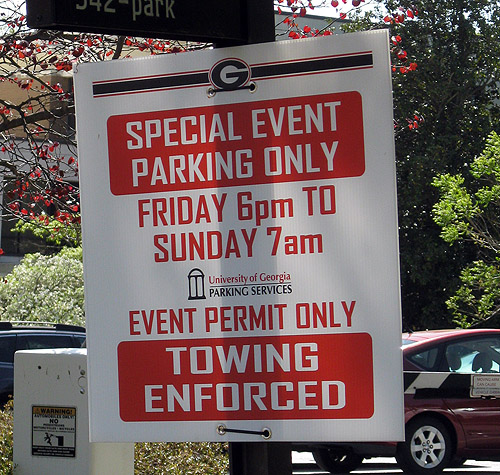
(No, the special-event parking was not for me, nor for the luncheon.
It's for a concert tomorrow by Jason Aldean, whoever that might be.
But it helped to set the tone.)
In keeping with tradition, we had a buffet lunch in the conference room:
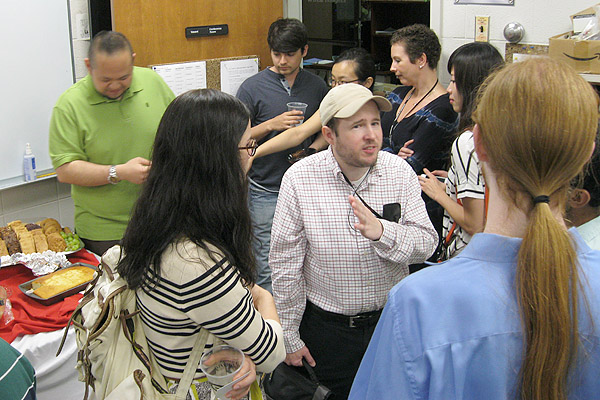
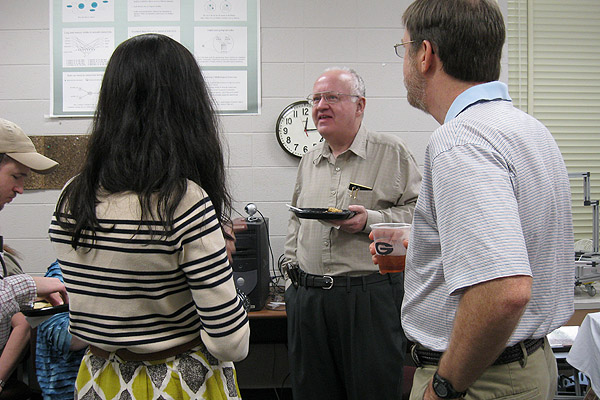
To my surprise, they gave me a trophy:
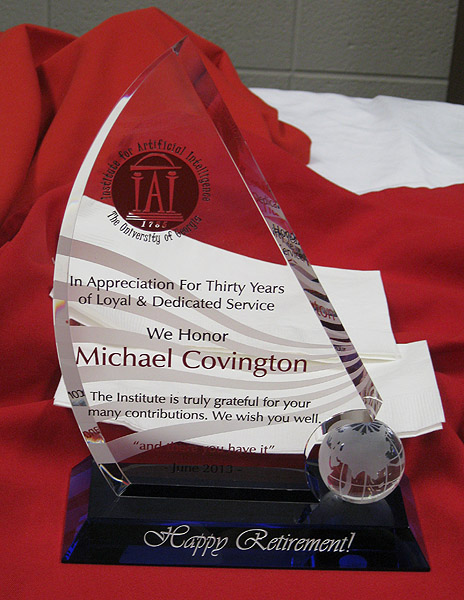
And then I gave a short speech, which I quote below, as best I can remember it.
It was an enjoyable gathering of colleagues and students present and past.
Permanent link to this entry
My retirement speech as best I can remember it
I really want to thank you all for honoring me this way. I've enjoyed working here
and hope to stay in touch with everyone.
I was thinking about some great literary quote to use when saying my farewells.
First I thought about the quotation from Catullus, the Latin poet, with which I
ended the valedictory speech that I gave at the University's 1977 graduation...
O dulces comitum valete coetus
Longe quos simul a domo profectos
Diverse variae viae reportant.
That says, "Farewell, sweet companionship of friends, whom as we set out far from
home, different roads carry in different directions." There. Latin has been spoken
on South Campus, for the first time in a while.
But that's not quite appropriate because we're not all splitting up. I'm the only
one who is setting off. So then I thought of quoting Bilbo Baggins:
"I have not known half of you half as well as I should have liked and have not
liked half of you half as well as you have deserved."
Extra points in LING 8570 if you can parse that.
But that's not quite appropriate either, because I'm not setting off on a long journey;
I'm staying right here in Athens and will be an active emeritus faculty member.
Finally I thought of the wise words in one of the last letters from campus that I
received from my undergraduate friend Rick Quarles, now the Rev. Rick Quarles —
he's an ordained minister. I haven't been able to track him down, so I'm quoting him
without his permission.
But I think his words are wise and appropriate.
The wise parting words of the Rev. Mr. Quarles, which are also my parting words to you,
were, and I quote:
"You ain't rid o' me yet!"
Permanent link to this entry


|
2013
April
7
|
Every kitchen needs one
 In twenty years, everybody who cooks, practically, will use one of these.
But why wait?
In twenty years, everybody who cooks, practically, will use one of these.
But why wait?
What you're looking at is an infrared non-contact thermometer.
It will tell you how hot something is in half a second, without touching it.
A laser pointer, built in, tells you exactly what it's aimed at.
(Or not, if you bought a cheaper model.)
This is normally an electrician's tool, and I bought one for testing electrical equipment
and wiring. (It's great for scanning for hot spots caused by bad connections.)
But as soon as Melody and Sharon got hold of it, it has stayed in the kitchen.
Why guess whether you've warmed something enough in the microwave oven,
or gotten it to safe cooking temperature, when you can know?
I've seen non-contact thermometers used in commercial kitchens.
They are part of the opening ritual of the cafeteria at the Georgia Center
for Continuing Education — they take the temperature of everything on
the steam table before they start serving it.
If you want one, either click on the picture or go to a place that sells
electricians' tools, such as Home Depot or Lowe's.
[Addendum:]
Sharon points out that this type of thermometer only measures surface
temperature. It's no substitute for sticking a meat thermometer into the
thing you're cooking. But it's very handy when you're reheating things
and want to know how warm you've gotten them.
Permanent link to this entry


|
2013
April
6
|
An algorithm for packing boxes when I move
I'm busy, which is why you haven't seen any more Ektachrome pictures yet.
The main thing I'm busy with is planning to move my books out of my UGA office.
Here's the packing algorithm I've arrived at. It is distantly descended
from the CYK Parsing Algorithm, which I'm teaching next week, although nobody
but me will probably see any resemblance.
(0) Melody suggested one really intelligent move: Office Depot will deliver
the empty boxes (Bankers Box SmoothMove) directly to my office; I won't try to
cart the empty boxes in from a distant parking lot.
(1) There will be two special boxes, packed when the opportunity presents itself:
Files From UGA, containing material to be preserved from filing cabinets
(one box at the most!), and Books For Downstairs, a collection of dignified-looking
but little-used books (such as Who's Who in America, which lists my uncle on
page 1 and me on page 300-something) that will remain in the living room.
Again, this will be just one box, the set of books that most deserve to be in the
living room.
(2) From there on, I will alternate packing low and high-priority books.
The books I am least likely to use will go in a box numbered 99.
Then the books I am most likely to use will go in a box numbered 1.
Then the least-used books remaining will go in box 98,
and then the most-used books remaining, in box 2, and so on.
There may be some stratification by subject matter, but the main criterion is how
much the books are used.
This continues until all the books are packed.
(Why not just throw out the least-used books? Because many of them are computer
manuals that will be of considerable historical interest in another twenty years.
Today's trash is tomorrow's antiques.)
Of course, there won't be 99 boxes; there will be a gap in the numbering.
But the sequence of the numbers will reflect the importance of the books.
The lowest numbers get priority for the upstairs home-office bookshelves;
the highest numbers go into the attic. Some intermediate numbers will stay
packed up, awaiting the construction of bookcases later in the summer.
(3) Finally, my nephews and their truck(s) will actually do the moving!
Permanent link to this entry


|
2013
April
4-5
|
A safety improvement to my 2012 Ford Escape
(Also applies to 2008-2011 Ford Escape)
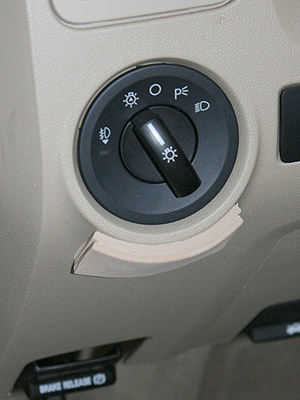
The underside of the headlight switch on my Ford has an unexpectedly
sharp edge. After skinning my leg on this three times in a year
and a half of car ownership, I decided to do something about it.
The pad is made of 3-mm craft foam from Hobby Lobby, chosen to match the
color of the car's interior, and held in place with carpet tape.
I used two layers, but one would probably do.
(What gets hit is my right leg, as I'm swinging it up to get into the car —
not my left leg as I'm sitting in it.)
Permanent link to this entry


|
2013
April
3
|
"Windows Defender couldn't turn on real-time protection"
If you can't enable Windows Defender after uninstalling McAfee or other antivirus packages, read on.
My Asus laptop came with McAfee. Today, less than a week after I bought it, McAfee started popping
up pesky messages every few seconds begging me to set up a subscription of some kind.
I was, of course, working on something entirely different that was fairly urgent.
I don't know whether I was about to have to pay for McAfee, or whether I could have had a substantial
free trial (maybe a year's?) if I had gone through with the subscription process.
But I didn't want to. I prefer Windows Defender (Microsoft Security Essentials on Windows 7 and earlier).
It's free and it comes from Microsoft.
In Windows 8, you don't have to install Defender; it's already there.
So I went to Control Panel, Programs and Features, and uninstalled McAfee.
Then I went to Control Panel, Windows Defender, and got the message that it wasn't turned on.
After fumbling around a bit, I went to Control Panel, Action Center, and was provided a nice
button to turn Windows Defender on.
Long delay, and then... "Windows Defender couldn't turn on real-time protection," with only a hex code
as further explanation.
Then I had to go on the Web (with my non-virus-protected computer!) to investigate further.
Bottom line: (1) Use McAfee's removal tool to
exterminate the last of McAfee; (2) in the Run or Search box, type services.msc
(or maybe go to Control Panel, Services) and make sure the Windows Defender service is started.
Several reboots may intervene between these steps. I didn't keep track.
You also might have to right-click on Action Center and choose "Run as Administrator" —
I'm not sure about that either.
Demerits to McAfee for holding my computer hostage for about an hour while I had better things to do!
I can understand that an antivirus package may be designed to resist uninstallation attempts,
to keep a virus from uninstalling it. But
if software will not actually uninstall from Control Panel, it should, instead, put up a message
explaining what's going on!
Permanent link to this entry


|
2013
April
1-2
|
The musicians' strike that changed the world
A bitter dispute over rights management gave
us jazz and LP records, meanwhile killing off older technologies (lower-quality records and local
music broadcasts) and nearly killing off the older set of musicians.
I hadn't realized the significance of the 1948 musicians' strike until Jeff Duntemann sent me
the link that I just gave you. Basically, before 1948, radio stations often hired local musicians;
the proliferation of good phonograph records made them unwilling to keep doing so; and
the musicians' union went on strike (from phonograph recording) for an entire year.
So what happened? Unconventional, un-unionized, mostly non-white musicians suddenly rose to prominence.
(I know jazz had existed for a long time already, but the 1948 strike suddenly raised its prominence
and changed its nature.) Meanwhile, to steer clear of the fight over radio, the phonograph industry created
two new media for new markets: the 33 1/3-rpm "long-playing" record (for classical music, and, more
importantly, for selling more than one song at a time on a single disc)
and the 45-rpm record for young people's highly portable record players.
The moral of the story? Any time you try to manage rights in a way contrary to the essential nature
of the technology, it's the kiss of death. Mere willpower will not keep technology from being used
for what it's best at.
The essence of the phonograph is cheap and easy reproduction of musical performances without the
musicians. The essence of modern digital audio is cheap and perfectly lossless copying and
distribution. Deny these at your own peril.
Permanent link to this entry


|
|
|
This is a private web page,
not hosted or sponsored by the University of Georgia.
Copyright 2013 Michael A. Covington.
Caching by search engines is permitted.
To go to the latest entry every day, bookmark
http://www.covingtoninnovations.com/michael/blog/Default.asp
and if you get the previous month, tell your browser to refresh.
Entries are most often uploaded around 0000 UT on the date given, which is the previous
evening in the United States. When I'm busy, entries are generally shorter and are
uploaded as much as a whole day in advance.
Minor corrections are often uploaded the following day. If you see a minor error,
please look again a day later to see if it has been corrected.
In compliance with U.S. FTC guidelines,
I am glad to point out that unless explicitly
indicated, I do not receive substantial payments, free merchandise, or other remuneration
for reviewing or mentioning products on this web site.
Any remuneration valued at more than about $10 will always be mentioned here,
and in any case my writing about products and dealers is always truthful.
I have a Tektronix
TDS 210A oscilloscope on long-term loan from the manufacturer. Other reviewed
products are usually things I purchased for my own use, or occasionally items
lent to me briefly by manufacturers and described as such.
I am an Amazon Associate, and almost all of my links to Amazon.com pay me a commission
if you make a purchase. This of course does not determine which items I recommend, since
I can get a commission on anything they sell.
|
|

















